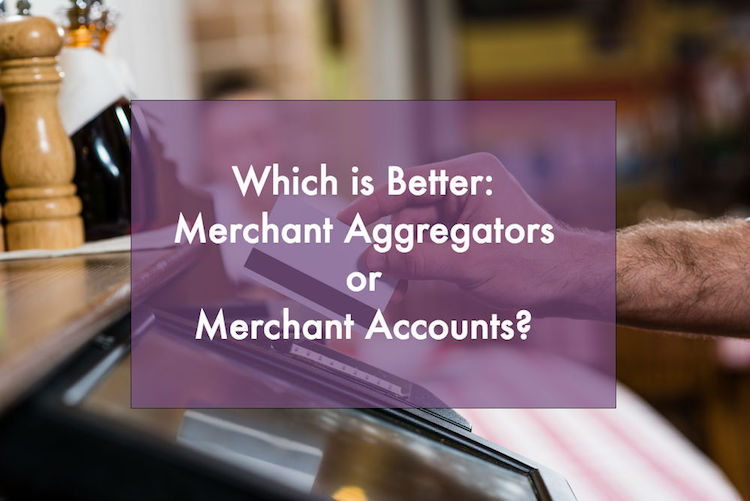
We get that you’re busy. Whether just starting a new ecommerce business or working to expand one, it takes all of your waking hours. There’s no end to the list of to-dos you need to handle.
One of the decisions you’ll need to make is how to accept online payments. Without the ability to accept at least debit and credit cards, you won’t make many sales. The payments journey is your ticket to success, so take the time to think it through and choose carefully.
We get that you’re busy. Whether just starting a new ecommerce business or working to expand one, it takes all of your waking hours. There’s no end to the list of to-dos you need to handle.
One of the decisions you’ll need to make is how to accept online payments. Without the ability to accept at least debit and credit cards, you won’t make many sales. The payments journey is your ticket to success, so take the time to think it through and choose carefully.
“Aggregators vs. merchant accounts” defines the standard debate merchants face when initially considering their payments options.
If you’re expanding to new territories, it might be time to think about how processing international payments changes the numbers.
Understanding various fee structures for cross-border transactions should help inform your initial choice of payment processor too. Costs can go awry as businesses grow.
But before we get you all worked up over the complexities of the payments industry, let’s look at the aggregators vs. merchant accounts debate. Here’s what you need to know.
Risk and Reward Drive the Financial Industry
Banks and payment aggregators (like Stripe, PayPal, Square, Google Checkout, Amazon Payments, and others) are in the business of making money for their owners. Risk management decisions are paramount and usually prevail over other considerations.
Banks and aggregators simply prohibit accounts for some types of businesses (online gambling, drugs, pornography, and the like). Note that the major payment card brands prohibit certain industries too.
“Normal” or low risk businesses may sail through the merchant account approval process. There will be some scrutiny, so get your business model and financial paperwork organized and ready.
Businesses labeled “high risk” face the highest hurdles because certain industries carry more risk for banks and other processors (adult sites, online dating merchants, occult services, travel, and others).
You may not like being lumped in with those other high-risk businesses, but the label is hard to shake. Banks and other processors will shy away from your business to protect theirs.
Be One of the Crowd with a Payment Aggregator
Payment aggregators (aka merchant aggregators) hold merchant account(s) with banks in their business names. Your sales transactions process through the aggregators’ merchant accounts along with all of payment card transactions from their other customers.
You may or may not be able to establish a unique identifier that shows your business name for transactions that appear on your customers’ monthly statements. When customers don’t recognize a purchase, it can lead to confusion and high chargeback rates.
When thinking through aggregators vs. merchant accounts for your business, think about availability of operating funds to stay afloat.
Monies from your sales pay into the aggregator’s merchant accounts when transactions settle, not directly to your bank account. It may take up to a week to receive your funds from an aggregator.
Many will place holds on merchants’ processing accounts without explanation. So you could find yourself without the ability to accept payments with little warning.
And while you may find it easy to get started with a payment aggregator, they’ll cancel your account in a heartbeat when chargebacks or anything they deem “suspicious” occurs.
Another consideration in the aggregators vs. merchant accounts debate relates to fraud guarantees and dispute processes. Be sure to investigate what’s offered, and look online for reviews from other merchants. Read all agreements carefully before signing anything.
Note too that very little personal service for you as an individual merchant distinguishes one aggregator from another.
Merchant Accounts Deliver One-to-One Relationships
Arrange an individual merchant account through a bank, and they’ll “acquire” and process payment transactions for your business. You may be able to work with your local banker, but that isn’t always the case. Much depends on the type and risk level of your business.
The good news? Some banks are willing to work with high risk businesses, both domestically and internationally. Your payments processor will be able to help you land an individual merchant account.
Advantages come into play even though it takes longer for approval and set up of an individual merchant account.
Processing rates tend to be lower when you process payment card transactions through an individual merchant account. Funding occurs more quickly, usually within 48 hours of transaction clearing.
And you’re more likely to receive one-on-one attention from the holder of your merchant account and your payments processor when issues arise… as they inevitably do for high risk ecommerce businesses.
Chargebacks are inevitable, but you’ll have more control over customer disputes with a merchant account. There’s a 30-day window to provide a rebuttal, not the short timeframe dictated by payment aggregators like PayPal. Check out the rules before you sign up.
Conclusion
There’s really no happy comparison of business benefits when debating payment aggregators vs. merchant accounts. You’re much better off working with a payment processing partner who will help you land an individual merchant account that meets your specific business needs.
Processors exist who specialize in working with high risk merchants. They’ve cultivated relationships with domestic and international banks willing to work with you, too, and will help you find the one for you.
Better yet, the right expert payment processor can consult with you on chargeback and fraud issues, and work with you to optimize security for your business website as well.
Choosing these characteristics for your payments processor always beats the cookie-cutter approach of a payment aggregator. Always.
